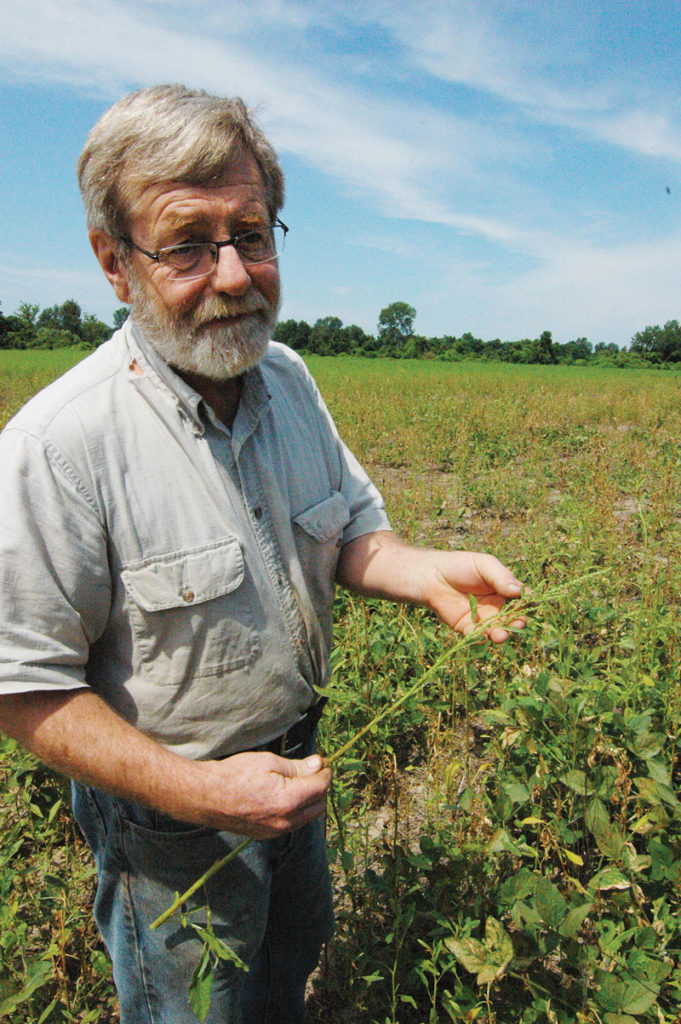
Trickle-Down Effect
December 25, 2015
Written By Linda Geist
Rain goes beyond farm community
In 45 years of farming, Boone County farmer Robert Brown has never seen anything like the flood of troubles Missouri faces this season.
“This year is the worst year of my life as far as soybean planting goes,” he says as he shakes his head. “Rain, rain and more rain. Thousands and thousands of acres not being planted.”
The May to July planting season fell just shy of breaking a 1981 record, says University of Missouri Extension climatologist Pat Guinan. July ranks fourth-wettest going back 121 years.
Yards grow; crops don’t

Most “city people” don’t understand the trials Missouri farmers faced this year, Brown says. It’s a troubling disconnect all too common between rural and urban, he says.
Brown and his wife own Katfish Katy’s campground on the Missouri River. They hear campers, kayakers and Katy Trail bikers talk about yards growing too quickly because of rain. They assume a bumper farm crop is on its way. Not so, says Brown.
Brown and his wife own Katfish Katy’s campground on the Missouri River. They hear campers, kayakers and Katy Trail bikers talk about yards growing too quickly because of rain. They assume a bumper farm crop is on its way. Not so, says Brown.
Few consider the rain’s economic impact on Missouri agriculture and rural communities, he says. They understand drought better than this year’s back-to-back rains.
Rains’ lasting impacts
Brown echoes MU Extension economist Ray Massey, who says the public does not understand the implications of prevented planting and poor crops.
On Aug. 17, the USDA said U.S. producers had the largest number of prevented planting acres for soybean since the agency began releasing numbers in 2007. Missouri was the No. 1 state in prevented planting acres with 506,039 acres of corn and more than a million acres of soybean.
This year 20 percent of the state’s intended soybean acres remain unplanted. Costly replanting occurred after fields flooded. Rains washed away millions of dollars of weedkiller and fertilizer. Elevators refused to buy disease-ridden wheat. Livestock producers struggled with muddy feedlots and overflowing lagoons. Hay is in short supply and of poor quality.
Those hardships show what is yet to come, says MU Extension agronomist Bill Wiebold. Topsoil erosion, soil compaction, nutrient deficiencies, disease and fallow fields carry over to next year.
River runs through it
The Missouri River running beside Brown’s campground is brown from topsoil carried off farmland left barren because of constant rain.
“In March and April the water was as clear as I’ve ever seen it,” Brown says. Then rains came. “Now it’s as muddy as I’ve ever seen it.”
Wiebold says cover crops are needed to keep topsoil from being washed into ditches, streams and rivers. He and other MU Extension specialists formed a task force to help producers. At times there were no research-based answers because they had never seen the problems faced this year.
Weeds, weeds, weeds
Brown jokes that he raised a good stand of waterhemp this year.
The prolific weed can grow 12 feet high and produce up to 1 million seeds per plant, says MU Extension weed scientist Kevin Bradley. It can reduce yield by 40 percent.
Rain washed away herbicides Brown had sprayed to control weeds. Waterhemp engulfed his fields and now towers over sparse soybean plants.
Waterhemp seeds remain in the soil up to four years, with 95 percent of the seed staying viable, Bradley says. That means more weeds.
Poor yields, poor prices
Earlier, Massey predicted lower crop prices in 2015 based upon trends. Now he’s lowering his outlook again.
Last year farmers enjoyed record crops and prices. Massey hopes producers saved some money instead of reinvesting it in land or machinery.
“Farmers who managed their cash over the last three to four years will weather this year,” he says. “But it will be a hardship for some.”
Crop insurance not a savior
Federal crop insurance helps farmers weather the storm, but it won’t cover all losses.
Farmers must lose more than 25 percent of crops to qualify. “At this point, crop conditions are not ideal, but they may not be 25 percent,” Massey notes. “Farmers may not have a good yield, but not bad enough to collect crop insurance.”
Massey said 85 percent of the state’s soybean producers and 87 percent of corn producers buy revenue protection insurance. Farmers insure a percentage of their crop against loss for prevented planting. “It gives them a little, but it doesn’t pay the bills,” he says.
Ripple effect
Soybean is the state’s leading cash crop.
The income lost to farmers impacts rural communities, says Judith Stallmann, MU Extension community development specialist.
Agriculture goes well beyond crops. Agritourism, including Missouri’s 120-plus wineries and vineyards, brings dollars to the state.
Agriculture supports jobs in fertilizer, pesticides, petroleum refining, machinery and repair, crop and animal processing, warehousing, transportation, and food manufacturing.
When farmers and their employees cut back, it hurts other local businesses. Big-ticket items such as furniture and vehicles may not be sold locally, so a ripple effect may be felt in nearby areas, Stallmann says.
“The extent to which a poor year for farming affects the community depends on how much farmers spend in the community and in the types of businesses that they patronize,” Stallmann says.
Tighter farm income hits in other less obvious ways, such as decreased charitable giving.
Farm income lower in 2015
Massey predicted soybean farmers would lose $43 per acre based upon low yields and prices in 2015. He now estimates a $50 per acre loss.
A recent USDA crop report shows 70 percent of Missouri’s soybean crop and 48 percent of the corn crop will yield less than average. If USDA’s soybean yield predictions of 38 bushel per acre are correct, it will be the biggest year-to-year drop since 2004-2005.
In poor crop years, prices typically rise to offset low yields, Massey says. However, low yields this year are limited mostly to Missouri rather than throughout the entire Corn Belt.
Poor prices plus poor yield equals hard times ahead.
What could farmers have done differently this year? Little, Massey says. “People will look at 2015 as the perfect storm of risk that they could not cover.”
At an MU Extension weekly teleconference, specialists said some farmers have given up hope on 2015 crops.
Cooper County agronomist Todd Lorenz likened farmers’ attitudes to the final stages of grief. “Most producers are at the acceptance stage and look forward to next year.”

